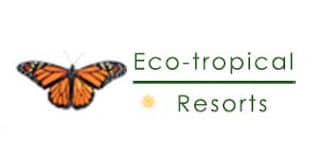Waterfall Villas working to save Pristine Watersheds in Costa Rica
After the recent rains, an overturned rock at the edge of the Cascadas Farallas Waterfalls shows various fossils of an Emu-type prehistoric animal that once roamed the Southern Pacific of Costa Rica. Now part of the Baru rainforest, this waterfall and the fossils are protected by the Waterfall Villas Private Wildlife Reserve. Fortunately, here the source of the waterfall is very close – underground and inside of rock bed, and there are no polluting sources upstream – only the otters, tiger heron, and the occasional jaguar wade upstream of the waterfalls usually in the summer months.
The water in the Cascadas Farallas Waterfalls is crystal clear and clean enough to drink, but the Waterfall Villas has recently invested in an ultra-violet filter as a second step to the exsisting carbon filter system to make sure that this water can be used throughout our eco-hotel without any chlorine! This ultra-violet system is now inplace and not using any chemicals that enter into our water is a great benefit to save the waterfalls and all of the wildlife around the Waterfall Villas!
The Cascadas Farallas Waterfall makes its way to the Baru River at the bottom of the mountain gorge also visible from our property, and then it winds like a snake to the ocean, and Dominical Beach. When you wash your hair at the Waterfall Villas you will feel the difference this makes! Not only will you be using chlorine free spring water, but also all of our artesian soap and shampoo is made locally, with no chemicals – only pure local made coconut oils and essential oils. Our Lang y Lang comes from Sabina at Finca Ipe, who lovingly collects thousands of flowers each year from her farm and provides us with this amazing oil that we also use at our Spa.
In Costa Rica, many efforts are being made to save pristine watershed areas such as Cascadas Farallas – part of the Biological Corridor of the Tapir that stretches from the Osa Peninsula to the mountains. ASANA the main conservation group in the area, has now extended its efforts to the Sevegre River, a unique biological zone blessed with many rare birds, and is very close to having this area pronounced a biological protected area by UNESCO. To have an area recognized by UNESCO requires a huge effort in educating the local population, and working with them in grass-roots sustainability meetings.
Some of the 4,000 local inhabitants of the Sevegre River live at the source, where there has been an unprecedented rise in trout farming. Fish farming at the source is lively hood for many people, but trout farming, as cattle farming result in runoff of chemicals. At the source of the Sevegre, this type of farming has required the transplantation of the nests some of the world’s most rare birds – the Quetzals that are prevalent in the area, to make room for artificial pools for raising trout. Fish farming also pollutes at the source of the river. Education about filtration systems, and other alternatives is a huge and slow process.
On the way to the Waterfall Villas in Costa Rica’s South Pacific region, you can visit the source of the Sevegre River in San Gerardo de Dota in the highlands of the Sierra del Muerte mountains. We would like to remind are eco-minded travelers to please try to find places to stay that do not raise trout or at least, have put in the new methods to filter the water. It is important to support real eco-hotels (beyond what certifications they have) that are truly on board with saving both the fabulous Quetzals and not polluting the water systems.
Waterfall Villas is the first corporate sponsor of ASANA committed to the preservation of natural areas in the South Pacific of Costa Rica, in the most dense biological diverse area of our planet. Waterfall Villas offers White Water Rafting in the Sevegre River, a non-obtrusive activity as part of our Adventure Tour portfolio.
To visit their website: Cascadas Farallas Waterfall Villas
